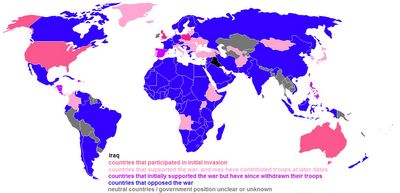
Defying the Word

President Bush announced that Kim Jong Il will find out what happens when he ignores the rest of the world by conducting missile tests. He specifically mentioned that North Korea had "defied China, South Korea, Japan and Russia. Later in his press conference, he accused Kim Jong Il of "trying to force us to do something by ignoring the world." Bush even specifically mentioned going to the UN Security Council to establish "some red lines" that Kim Jong Il shouldn't cross.
Hmmm. Interestingly enough, China, Russia, and North Korea officially called for UN sanctions against the US for invading Iraq and defying the world.
It seems that had Bush followed his own advice on not defying the world back before he chose to invade Iraq, we'd be 2500 troops stronger, and billions of dollars richer right now. Who knows, maybe we'd even have made some progress in solving the issues we face here at home.
Check out the map. The "blue countries" are those that opposed the invasion of Iraq. The political leaders in those countries knew that Saddam Hussein was surrounded by the US and our allies. That he was powerless and that sanctions against him would eventually force a change at the hands of Iraqi citizens with UN, not US support, NOT at the hands of American troops. Those leaders probably even suspected that Iraq posed little or no threat to the US and that there was little or no connection between the 9/11 and Iraq. The leaders of those "blue nations" knew that Saddam presented no threat to anyone outside of his own country and that the best way to deal with him was to present (to use Bush's words from his Chicago press conference) one voice of the world to force him to comply with the world's demands. The UN security council agreed with the "blue nations" and felt that diplomacy had not, in fact, been exhausted in dealing with Saddam. THE WORLD felt we had plenty of time and that an invasion wasn't necessary.
Far be it from me to suggest that we shouldn't learn from our mistakes. In fact, I see that as a fairly admirable trait. One we should expect of our leaders for sure. When John Kerry went to Vietnam, (did I mention Bush didn't?) he was a proud, young, idealistic US Naval officer with the same romantic notion of war that most armchair soldiers and politicians safely home in the US have today. He learned first-hand how wrong that notion was. He acted appropriately given the new information he acquired and came home to tell everyone what he saw, how unorganized it was, and how the lack of any clear, specific US objective rendered the war a waste of resources at best, a dangerous diversion and blunder that hurt the US reputation at home and abroad at worst. So Kerry learned to correct his youthful foolishness. But the Bush administration hasn't made any mistakes, so how can they learn from them.
Now I'm not saying that no one in Vietnam or Iraq acted heroically or made sacrifices they felt were in the interest of the nation. That's a whole other argument. Soldiers on the ground then, like today, don't get to choose the wars they fight. They do their jobs. They do them well, and for that, they should be recognized, but the people who send them there should have a better understanding of what that means and rather than spinning their sacrifices into some kind of twisted jusification for the war, they should deal with those two separate issues as just that: separate issues. They should face the questions on the justification for the war BEFORE putting troops in harm's way, not put them there and then use their dedication as justification.
The point is, however, that the Bush administration used Kerry's experience and spun it as flip-flopping.
Perhaps that's why Bush can't admit mistakes even when he blatantly reverses his position on issues like defying the world to invade Iraq (actual use of military might, not just a test of a weapons system) or using strategic oil reserves to moderate gas prices or... I could go on, but what's the point.
I'm not saying Kerry is my hero, as has often been suggested here. I'm simply using him as a comparison since this administration has so often criticized him for doing exactly what they've done since the first campaign. Why are so many Americans so unwilling to apply this administration's own rules to this administration? Why do so many only criticize people like Kerry for doing things this administration does while letting the administration get away with it? Why now is Bush getting away with criticizing Kim Jong Il for doing what Bush himself did in invading Iraq?
In his press conference, Bush suggested that Kim Jong Il should pay a price for defying the world's opinion on his missile tests. It's pretty obvious that the US has already paid a price for defying the world's position on invading Iraq. How much longer will we pay such a price without asking Bush to pay a part of it as well?
Map source: http://en.wikipedia.org/wiki/Governments%27_positions_pre-2003_invasion_of_Iraq
Speech transcript: http://www.nytimes.com/2006/07/07/washington/07text-bush.html?pagewanted=1
2 comments:
OK, I'm waiting for some kind of a remark about Bush's quick shoulder rub.
Bush and Kim Jong Il may be polar opposites from one perspective, but from the perspective of defying the rest of the world in order to continue with one's own agenda, well, they have that in common. They do. What caught my attention about it is the fact that Bush did it by invading Iraq... his only real "accomplishment" in two terms, but seemed to forget the global dissent when applying the same criteria to North Korea. Let's face it, there are probably 5 or 6 nations who DO support Kim Jong Il... about the same as the "coalition" supporting us in Iraq.
The shoulder rub is too easy.
Post a Comment